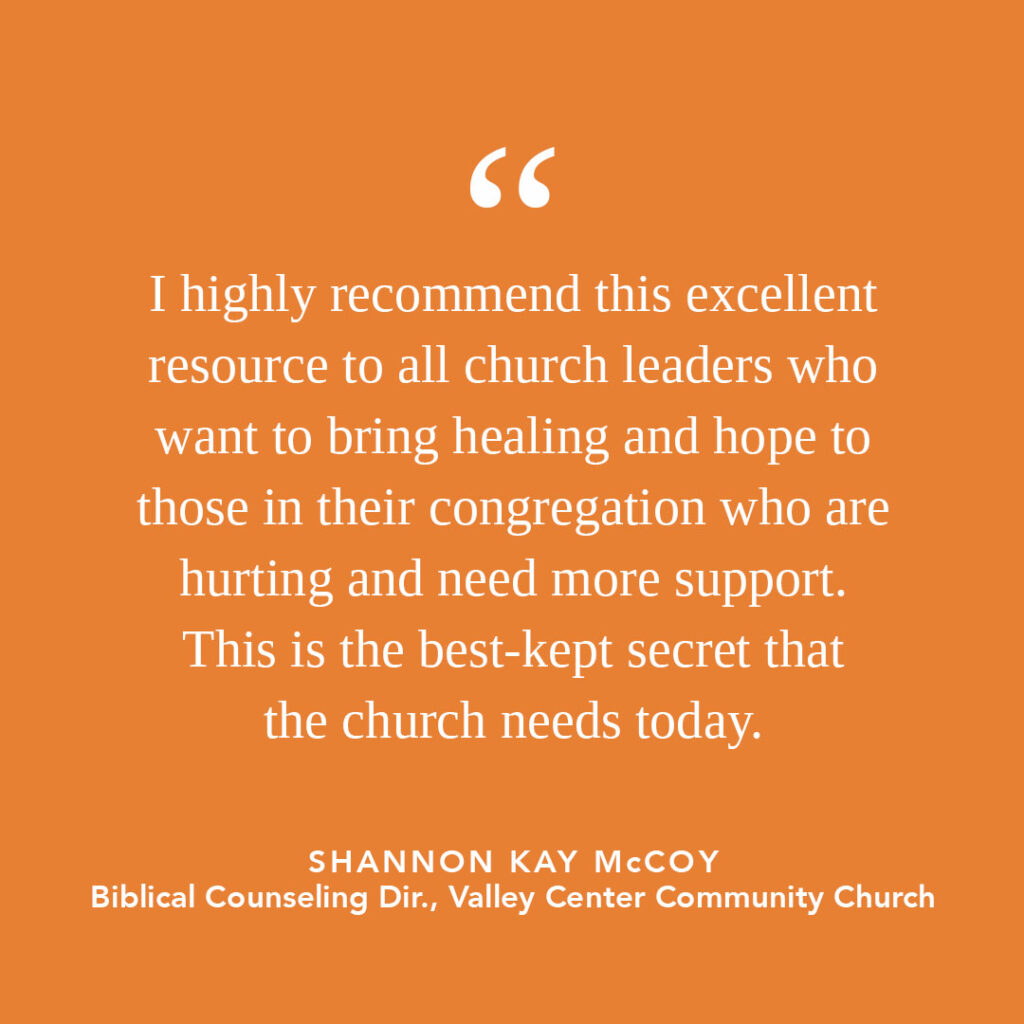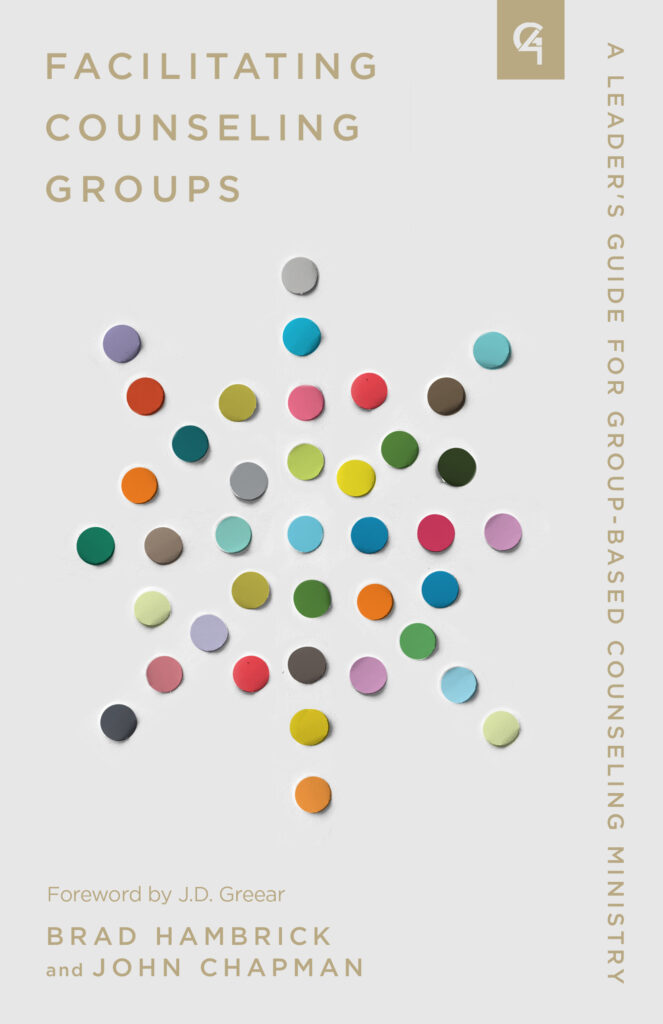The following post is an excerpt from Facilitating Counseling Groups by Brad Hambrick and John Chapman, the second book in the Church-Based Counseling series provides training for lay leaders to guide a group-based church counseling ministry (G4 model) that addresses common life struggles.
Leading a counseling group is different from leading a general discipleship group, even if both exist at the same church. A counseling group focuses on a specific need, garners heightened levels of vulnerability about matters of greater sensitivity, and requires more skill and intentionality from its leader. When a layperson is well-equipped, this kind of ministry is tremendously rewarding, as they see God multiply the work he did in their life with people walking a similar journey.
When anyone in your church or community asks, “What is G4?” or “What would I get from a G4 group?” you want everyone to receive a consistent answer. Whether you’re leading a group on addiction, eating disorders, purity, trauma, or another life struggle, we want you to communicate shared DNA that is the essence of a G4 ministry.
WHAT IS G4?
G4 is a lay-led, group-based counseling ministry built around two nine-step models of change. G4 provides a context for participants to invest a season of their life overcoming a life-dominating struggle of sin or suffering. With the support of their fellow group members, G4 participants work through a biblically based curriculum focused on their primary life struggle.
The goal of G4 is to see participants graduate back into the discipleship ministries of their church, freer from their struggle and with a clearer picture of what it means for believers to care for one another as the gospel transforms the most difficult parts of our lives.
WHY THE NAME “G4”?
“G” is for gospel-centered groups. Too often in counseling groups our struggle becomes our identity. The longer someone is in group, the more their identity becomes “addict,” “depressed,” or “divorced.” The benefit of finding a place to be known comes with the potential drawback of embracing a struggle-based identity.
We place the “G” at the forefront of G4 to serve as a perpetual reminder that our identity is not found in our struggle but in our Savior—Jesus Christ. Yes, we struggle. Yes, it is freeing to have a place to be honest about our struggle. But, no, our struggle does not define us. The gospel tells us who we are and has the power to transform us into the person God created us to be.
The number “4” is for the four classifications of groups that can be housed within a G4 ministry. Not all counseling groups are the same. If you put one type of group at the forefront of your ministry, it inadvertently communicates a limited scope of care. For instance, if you label your ministry a recovery ministry, it gives the impression that it only deals with addiction. We chose the name G4 to prevent it from being unduly associated with only one niche of life struggles. A basic definition for each of the four types of groups follows:
- Recovery Groups are for overcoming destructive, habituated life patterns a participant wants to remove from their life. Recovery groups are for struggles like substance abuse, chemical addiction, or behavioral addictions (i.e., pornography or gambling).
- Process Groups are for decreasing the life disruption caused by profoundly difficult experiences or especially “sticky” emotions. Process groups are for experiences such as trauma or the aftermath of destructive relationships.
- Support Groups are for mutual encouragement as participants persevere through difficult life experiences that persist for an indefinite length of time. Support groups are for experiences like divorce, depression, or grief.
- Therapeutic Educational Groups provide a better understanding of life challenges that are commonly misunderstood. Therapeutic educational groups might offer a holistic Christian perspective on mental health or help participants identify common challenges for blended families.
A G4 ministry does not need to have a group from each type to be called G4. For instance, if a church only had recovery groups and process groups in its offerings, it would not be called G2. Further, the types of groups are not as distinct as they initially appear. All groups, to some degree, offer therapeutic education. Every type of group involves processing difficult experiences together. It is not important that every group fit neatly into one of the four types. It is important to be clear what distinguishes G4 groups from general discipleship groups or classes within your church.
The goal of a benign name like G4 is to destigmatize a ministry that might otherwise be hard to talk about. Participants can say “I’ve got a G4 meeting tonight” without disclosing more than they intend. A pastor preaching on purity can talk about the G4 groups at church without trying to define sexual addiction. A ministry that depends on word of mouth needs to be easy to talk about.
G4 was also designed to house non-nine-step groups. We intentionally created G4 to allow you to use more than just G4 nine-step curriculums.
WHAT ARE DIFFERENCES BETWEEN A SMALL GROUP AND A G4 GROUP?
Now that you understand the various purposes G4 groups can serve, we can begin to differentiate G4 from the general discipleship groups in your church, whether your church calls those Sunday school classes, life groups, community groups, small groups, or something else. We can begin identifying important distinctions by asking, “What does a general small group look like?” While the structure can vary from church to church, most general discipleship groups have some common features. A small group usually consists of seven to fifteen people who meet weekly to discuss the Bible, pray, care for one another, and do ministry together.
The following description can help you understand what makes G4 different:
- G4 groups meet for a narrow purpose, to address a specific struggle or life transition.
- G4 groups are a place to overcome a struggle rather than “do ministry together.”
- G4 is not a Bible study. It is a counseling group that utilizes a distinctively Christian curriculum to help participants grow in a particular area of their life.
- G4 groups are short-term and are not intended to be a participant’s ongoing source of community.
Small groups focus on general discipleship—cultivating the overall spiritual maturity of believers who are facing a variety of life challenges—while G4 does targeted discipleship—setting aside a season of life to overcome a specific struggle with people facing a similar struggle.
General discipleship groups are often organized around factors like age (i.e., young adults, seniors, etc.), geography (i.e., driving distance to a host home), or relational status (i.e., young couples or singles). G4 groups organize around a common life struggle.
No one graduates from a general discipleship group. There’s always more character refinement to be done and more to understand in the Bible. In G4, participants remain in their group only until they reach a satisfying level of change for their life struggle.
G4 and general discipleship groups should have a symbiotic relationship, each giving life to the other. G4 provides a space for people to focus on a single area of needed change. This prevents general discipleship groups from being overwhelmed by an intense need in the life of one member. General discipleship groups provide a context of support after G4, so that G4 doesn’t inadvertently reinforce a struggle-based identity.

Excerpted from Facilitating Counseling Groups © 2023 by Brad Hambrick and John Chapman. Used with permission of New Growth Press. May not be reproduced without prior written permission.
Facilitating Counseling Groups
Leading a counseling group is different from leading a general discipleship group, even if both exist at the same church. A counseling group focuses on a specific need, garners heightened levels of vulnerability about matters of greater sensitivity, and requires more skill and intentionality from its leader. When a layperson is well-equipped, this kind of ministry is tremendously rewarding, as they see God multiply the work he did in their life with people walking a similar journey.






